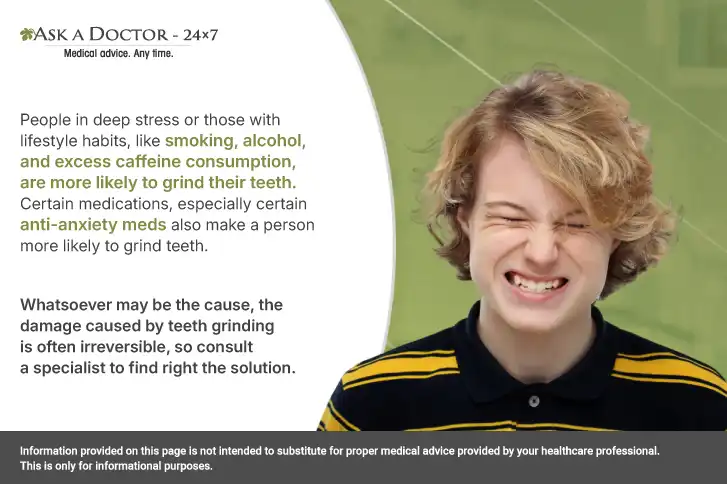Why Do People Grind Their Teeth? Identify The Causes And Solutions To Treat This Disorder
Teeth grinding or jaw clenching is medically called ‘Bruxism’. Anyone suffering from this condition may unconsciously clench their teeth at any time, whether they are awake (Awake Bruxism) or while sleeping (Sleep Bruxism). If it occurs regularly, it can cause severe damage to your teeth and overall oral health.
Read here in detail all about bruxism and also learn ways to treat it.
Why Do People Grind Their Teeth?

Here are the factors that usually cause people to grind their teeth or experience bruxism:
- Misaligned jaw or teeth: Abnormal alignment of upper and lower teeth (malocclusion) leads to teeth grinding.
- Stress: Emotions such as anxiety, suppressed anger, frustration, or tension, or even deep concentration, result in Bruxism.
- Age: Teeth grinding habit is commonly observed in young children and teens. This habit usually evades as they turn into adults.
- Personality Type: An aggressive, competitive, or hyperactive personality type is more prone to grind or clench their teeth.
- Lifestyle factors: Drinking too much alcohol or smoking, or having lots of caffeinated drinks and teas, can lead to clenching and grinding teeth.
- Hallucinations: Seeing or hearing things that aren't real may also result in Bruxism.
- Health Disorders: Medical disorders such as Temporomandibular Joint (TMJ), Generalized Anxiety Disorder (GAD), Parkinson's disease, Dementia, Epilepsy, and Sleep-related disorders like Sleep Paralysis, Obstructive Sleep Apnea (OSA), and attention-deficit/hyperactivity disorder (ADHD) are also known to cause Bruxism.
- Medication Side Effects: An uncommon side effect of some antidepressants also increases the risk of Bruxism.
4 Simple Solutions to Stop the Habit of Grinding Habit
The following ways can help mitigate the teeth grinding habit:
1. Wear a mouth guard or mouth splint
These dental appliances create a physical barrier between your upper and lower teeth, thereby balancing the pressure across your jawline. It also helps decrease the grinding noises.
2. Avoid stress
Relax and get a good night's sleep to avoid stress. Muscle-relaxation exercises like practicing yoga, deep breathing, getting a good body massage, reading before bedtime, and listening to music may also help in controlling stress-related teeth grinding.
3. Modify your lifestyle
Control alcohol intake, give up smoking, and avoid using any recreational drugs such as cocaine to stay away from bruxism.
4. Get enrolled for therapies
Cognitive Behavioral Therapy and Habit-reversal techniques to control bruxism. Consult your doctor or a certified specialist to know about cognitive therapy techniques in detail.
Conclusion
If you suspect that you may be grinding your teeth, consult an orthodontist at the earliest. S/he will examine your mouth and jaw for signs of bruxism and will accordingly plan your treatment program. Stay alert to stay healthy!
For any query related to teeth and oral health, you can Ask a Dentist at Ask a Doctor 24x7.
Recently Answered Questions Related to Dental Health
- Why Do I Quench My Teeth All Day?
- Is It Safe To Grind Teeth With A Filer For Teeth Alignment?
- Headaches From Jaw To Cranium, Habit Of Teeth Grinding. Is It a Symptom Of Bruxism?
- Suggest a Remedy For A Jaw Alignment Problem
- Suggest a Remedy To Get Proper Jaw Alignment After Fillings
- Suggest Treatment For Temporomandibular Disorders And Bruxism
- Jaw Pain In The Morning, Ear Pain, Teeth Feel Loose. No Teeth Cavities. What Can I Do To Improve My Condition?
- How To Treat Misalignment Of Jaws?
- Are Permanent Braces The Right Treatment For Buckteeth?
- Does Stress Cause Nocturnal Teeth Grinding?
Disclaimer: Information provided on this page is not intended to substitute for proper medical advice provided by your healthcare professional. This is only for informational purposes.
Ask a Specialist
Recent Questions


